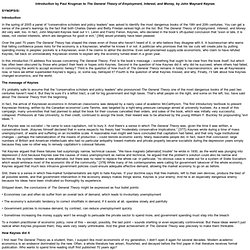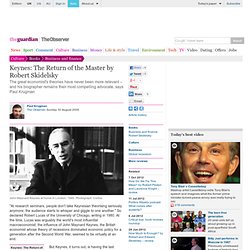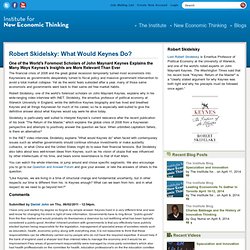

John Maynard Keynes - Life - ideas - Legacy. Was Keynesianism Discredited in the 1970s? I often hear the notion thrown around that Keynesian ideas were discredited in the 1970s by the process of stagflation.

Exemplifying this, the well-known Chicagoan economist Thomas Sowell claimed in a recent column that “Janet Yellen represents the Keynesian economics that once dominated economic theory and policy like a national religion — until it encountered two things: Milton Friedman and the stagflation of the 1970s.” So what does Thomas Sowell claim that Milton Friedman and stagflation discredited? John Maynard Keynes's Life, 1918-1936. From Brad DeLong: Review of Robert Skidelsky (2000), "John Maynard Keynes: Fighting for Britain": Time passed.

The death toll from WWI mounted toward ten million, Keynes became angrier and angrier at this civilization-breaking catastrophe, and angrier and angrier at the politicians who could see no way forward other than mixing more blood with the mud of Paaschendaele. At the Versailles peace conference the new democratic German government was treated as a foe rather than a potential ally. The object became to extract as much in plunder and reparations from Germany as possible. The General Theory of Employment, Interest and Money. Introduction by Paul Krugman to The General Theory of Employment, Interest, and Money. Introduction In the spring of 2005 a panel of “conservative scholars and policy leaders” was asked to identify the most dangerous books of the 19th and 20th centuries.

You can get a sense of the panel’s leanings by the fact that both Charles Darwin and Betty Friedan ranked high on the list. But The General Theory of Employment, Interest, and Money did very well, too. In fact, John Maynard Keynes beat out V.I. Lenin and Frantz Fanon. Over the past 70 years The General Theory has shaped the views even of those who haven’t heard of it, or who believe they disagree with it. In this introduction I’ll address five issues concerning The General Theory. The Fall and Rise of Keynesian Economics: John Eatwell. Lord Eatwell - Faculty - Faculty & Research - Cambridge Judge Business School.
Fellow in Financial Policy Professional experience Lord Eatwell is President of Queens' College.

He is also a director of SAV Credit and an adviser to the private equity firms Warburg Pincus & Company International and Palamon Capital Partners. Keynes and the Crisis of Capitalism. John Maynard Keynes. Keynesian Economics. "At research seminars, people don't take Keynesian theorising seriously anymore; the audience starts to whisper and giggle to one another.

" So declared Robert Lucas of the University of Chicago, writing in 1980. At the time, Lucas was arguably the world's most influential macroeconomist; the influence of John Maynard Keynes, the British economist whose theory of recessions dominated economic policy for a generation after the Second World War, seemed to be virtually at an end. Keynes: The Return of the Master by Robert Skidelsky But Keynes, it turns out, is having the last giggle. Lucas's "rational expectations" theory of booms and slumps has shown itself to be completely useless in the current world crisis. But while Keynesianism is experiencing a revival, there are major questions about just what needs to be revived.
What Would John Maynard Keynes Tell Us to Do Now? Half a decade has passed since the bursting of a huge asset-price bubble, and the U.S. economy is still depressed.

More than ten million Americans are jobless, and many more are working part time. The gross domestic product has yet to recover its pre-bust level. In Florida and other areas where the speculative frenzy ran hot, vast developments stand empty. Overseas, things are no better, and in some places they’re worse. Britain looks much like America. So conditions are grim when, on New Year’s Day, 1935, the English economist John Maynard Keynes mails a letter to George Bernard Shaw. The ideas of economists and political philosophers, both when they are right and when they are wrong, are more powerful than is commonly understood. Today, some regard Keynes himself as that academic scribbler, entrancing a generation of mindless followers. The publishing industry, at least, has been bullish on Keynes in the past few years. History - John Maynard Keynes.
John Maynard Keynes - Hyman Minsky - McGraw-Hill Education. The Fall and Rise of Keynesian Economics: John Eatwell. Keynes: The Return of the Master. Robert Skidelsky: What Would Keynes Do? The financial crisis of 2008 and the great global recession temporarily turned most economists into Keynesians as governments desperately turned to fiscal policy and massive government intervention to avoid a total market collapse.

Yet as the worst fears subsided after a year, many of those same economists and governments went back to their same old free market habits. Robert Skidelsky, one of the world’s foremost scholars on John Maynard Keynes, explains why in his wide-ranging video interview with INET. Skidelsky, the emeritus professor of political economy at Warwick University in England, wrote the definitive Keynes biography and has lived and breathed Keynes and all things Keynesian for much of his career, so he is especially well-suited to give the definitive answer about what Keynes would say were he alive today.
You can watch the whole interview, or jump around and chose specific segments. Keynes, The Economic Consequences of the Peace.